Statement
Assume that $\sigma\in (1,+\infty)$, $N\in[3,+\infty)\cap \mathbb{Z}$, $p,t\in (0,1)$, $n_1\in\{0,1,2,\cdots,N-1\}$. Prove or disprove that $$[B(n_1)]^\frac{1}{\sigma} - [B(n_1+1)]^\frac{1}{\sigma} < 1 .$$ Here, the function $B$ is defined as $$ B(n_1):=\sum_{n_2=0}^{N-n_1} p(n_2 \mid n_1) \cdot \left( n_2+(N-n_1-n_2)t \right)^\sigma ,\ 0\le n_1\le N.$$
Here, $p(n_2 \mid n_1)$ is a conditional probability distribution satisfying $$ \begin{cases} \displaystyle\sum_{n_2=0}^{N-n_1} p(n_2\mid n_1) = 1 \\ \displaystyle\sum_{n_2=0}^{N-n_1} n_2\cdot p(n_2\mid n_1)=p\cdot (N-n_1) \end{cases} ,\ 0\le n_1\le N. $$
Motivation
Actually, this proposition is a generalization of An inequality about binomial distribution, which has been solved by @FedorPetrov. When $p(n_2\mid n_1) = \binom{N-n_1}{n_2}p^{n_2}(1-p)^{N-n_1-n_2}$, it is transformed into that problem.
My attempts
Assume that the random variables $N_1$ and $N_2$ such that the conditional probability mass function of $N_2$ given $N_1 = n_1$ is $\operatorname{P}(N_2 = n_2\mid N_1 = n_1) = p(n_2\mid n_1) $. Then we have $\mathbb{E}(N_2\mid N_1) = p\cdot (N-N_1)$, and $B(n_1)=\mathbb{E}( ( N_2 + (N-N_1-N_2)t )^\sigma \mid N_1 = n_1)$. But then I got stuck.
So how to prove or disprove this inequality? Thanks in advance!

